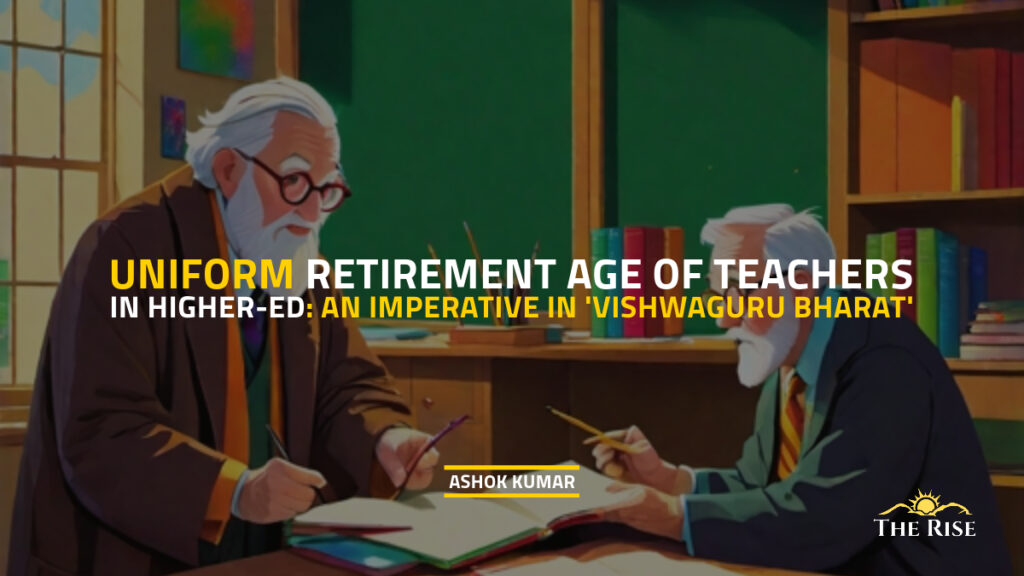Increasing the retirement age of teachers will improve the quality of education as experienced teachers can offer better guidance and instructions to their students. If the retirement age of teachers across the nation is not increased then going by the available data the number of teachers with 20 years of experience or more will greatly reduce after 2027. Hence, the retirement age of college and university teachers all across the country should be increased to the uniform limit of sixty-five years.
Social security coverage, in terms of old age, has been among the lowest in India compared to developed nations in the West. The age of superannuation in India has been around 60 years for more than three decades, which is one of the lowest globally. The retirement age for central government employees was last revised in May 1998, when it was increased from 58 to 60 years. Even in the private sector it falls in the range of 58 to 62 years, and for doctors and a small portion of the workforce, such as scientific officers, it is around 60 years. According to the World Bank, the life expectancy in India was 61.7 years in 1998, which increased to 70.1 years by 2020 with life expectancy in states like Kerala, and Tamil Nadu being higher than the national average.
Also Read: Education: Politics and Politicization
In the field of education, experience and knowledge are significant and mandatory prerequisites. Teachers must have in-depth knowledge and skills in their disciplines of study. This knowledge and skill develop only with experience. Therefore, teachers should be given enough time to share their experiences and knowledge with the students.
Increasing the retirement age of teachers will improve the quality of education as experienced teachers can offer better guidance and instructions to their students.
Retirement age is an important policy issue. This can have significant implications for teachers, students, and the education system. Increasing the retirement age of teachers will improve the quality of education as experienced teachers can offer better guidance and instructions to their students. They can inspire students to research and innovate. Increasing the retirement age of teachers shall provide opportunities for young talents.
Increasing the retirement age will provide an opportunity for young talents to remain under the tutelage of experienced mentors for a long period, grow academically and introduce new ideas in their respective fields. Increasing the retirement age gives teachers more time for their professional development. They can learn new skills and knowledge, and teach their students more effectively. Moreover, experienced teachers are usually experts in their field and can deliver a more thorough and informative education to their students.
Also Read: AI Chatbots May Devitalize Ingenuity: Arrival of New Disruptors in Education
At present, the retirement age of college and university teachers in India varies according to the state. In some states, it is 60 years, while in some states it is either 62 or 65 years. This difference is highly discriminatory for teachers. Ensuring a uniform retirement age will lead to equal opportunities and equal rights for teachers.
UGC has set the retirement age limit of university teachers at 65 years. This age limit is the same for all universities and colleges. According to the UGC, the retirement age has been determined in such a way that teachers can continue their work effectively. Experienced teachers can give better guidance and instruction to their students. Therefore, the retirement age has been fixed in such a way that teachers can share their experiences with the students.
The difference in the retirement age across the states highly discriminatory for teachers. Ensuring a uniform retirement age will lead to equal opportunities and equal rights for teachers.
Also Read: The Future of India’s Future: Increasing Global Education Opportunities for Indian Students
However, some argue that increasing the retirement age of teachers will harm students. Increasing the retirement age may make it difficult for colleges and universities to hire new teachers. According to them, young teachers are more energetic, motivating and open to new ideas than experienced teachers. However, this argument is not based on facts. Many studies have shown that experienced teachers can help their students perform better. The population in India is growing, and every year millions of young people enrol in colleges and universities. Therefore, colleges and universities will always have no shortage of new teachers.
Teachers should have the same retirement age across the nation. The reasons for this are as follows:
- Education is a national issue. Education is a fundamental right for all citizens. Therefore, it is important to have uniform standards and policies in the field of education. Therefore, it is appropriate to discuss and decide on this issue at a national level.
- A uniform retirement age will ensure that teachers get equal opportunities and equal rights. At present, the retirement age of teachers varies in different states causing a feeling of being discriminated against among those teachers whose age of superannuation is lower to others.
- A uniform retirement age will ensure that such negative feelings that are detrimental to the health of education are not nurtured by teachers and that teachers spend time in academic activities in a smooth manner. It has been proved by a number of studies that experienced teachers provide better guidance and instruction to their students. They can inspire students for research and innovation.
Overall, the above reasons present a strong case in the favour of setting the retirement age of college and university teachers in India uniformly at 65 years. This shall be beneficial not only for teachers but also for students and for the overall educational system.
If the retirement age of teachers across the nation is not increased then going by the available data the number of teachers with 20 years of experience or more will greatly reduce after 2027.
With a uniform retirement age, teachers will have equal opportunities across the country. This will help them make the most of their skills and knowledge, and it will also help in strengthening the education system of India. This will take care of the problem shortage of teachers that HEIs are currently fighting.
If the retirement age of teachers across the nation is not increased then going by the available data the number of teachers with 20 years of experience or more will greatly reduce after 2027. The most significant effect of this shall be that research will be adversely affected, something which the Indian higher education system cannot afford at this stage of globalization of higher education standards. But with the increase in retirement age, there will be no shortage of experienced teachers leading to a substantial boost in the quality of research and teaching.
However, increasing the retirement age may reduce the opportunities of new talents to enter the arena of higher education as faculty members in time, leading to academic fossilization
Increasing the retirement age will also pose some challenges. For example, colleges and universities may have difficulty finding and hiring new teachers. Moreover, new talents may lose the opportunity to enter the arena of higher education as faculty members in time leading to academic fossilization. Talented youngsters interested in joining academics may migrate to other jobs leading to a professional brain drain. However, these challenges can be overcome by increasing sanctioned posts in terms of the student-teacher ratio which is abominably bad in most Indian HEIs. The benefits of raising the age of superannuation will far outweigh these challenges.
Read the PDF Version Below:
Disclaimer: The views expressed in this article are of the author solely. TheRise.co.in neither endorses nor is responsible for them. Reproducing this content without permission is prohibited.
About the author
Prof. Ashok Kumar is former Vice-Chancellor of Deen Dayal Upadhyaya University, Gorakhpur (U.P.) & CSJM University, Kanpur, (U.P.), Nirwan University, Jaipur, Rajasthan, and Shri Kallaji Vedic University, Nimbahera, Rajasthan. He is President of the Social Research Foundation, International Society of Life Sciences.





























Pingback: Mapping The Higher Education Ecosystem Of India - TheRise.co.in